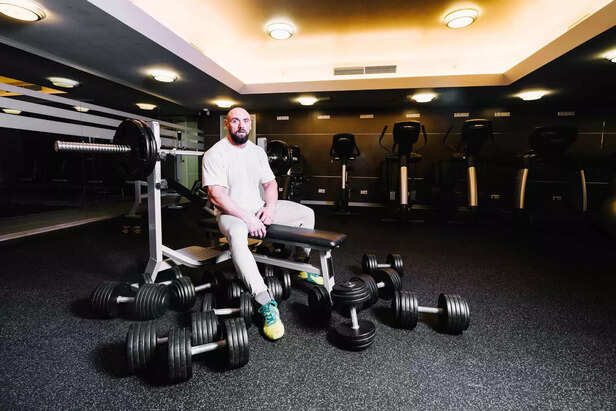Ditch the Gym? The Real Way to Get Healthy Might Shock You
Amritansh Nayak | Jul 17, 2025, 23:45 IST
( Image credit : Freepik )
The fitness industry has marketed health, transforming it into an image-based product. This essay examines how gym culture frequently disregards mental health, natural movement, and personal requirements. By moving the emphasis from aesthetics to overall well-being, it empowers people to reclaim control and redefine fitness as a long-term, emotional, and highly personal journey.
We live in a culture where fitness is frequently associated with flawless bodies and sparkling gym equipment. But what if everything we've learned about health is a carefully marketed illusion? In today's commercial economy, fitness is about image, profit, and trends rather than personal wellness. This article calls into question the notion that gym memberships, pills, or influential exercises equal actual health. Instead, it focuses on natural movement, emotional balance, and self-acceptance as the true keys to long-term health and well-being. It's time to reconsider what being fit really entails.

In today's overly commercialized society, the fitness industry has ingeniously reinterpreted health as a shiny aesthetic—chiseled abs, toned bodies, and ideal proportions. The narrative propagated through social media and gym marketing is less about practical fitness or mental well-being, and more about presenting an image that conforms to modern beauty standards rather than actual health. This trend has made exercise less about personal well-being and more about consumption. Millions are enticed into purchasing expensive gym memberships, fashionable fitness gear, and an unlimited supply of "essential" vitamins.
Influencers promote transformational journeys that are frequently filtered, sponsored, or motivated by unhealthy habits. Instead of encouraging self-care, the industry frequently profits on insecurity, capitalizing on the belief that you're never "fit enough" unless you look a specific way. This marketing trap has increased the gap between appearance and actual health. A person may appear fit but suffer from worry, poor sleep, or nutritional abnormalities. True fitness is about balance—physical strength, mental tranquility, and emotional stability—rather than just a number on a scale or the definition of your abs. It's time to move our attention away from image-based fitness and toward sustainable, inclusive, and practical health habits for all.

In an era dominated by gym machines and cutting-edge training equipment, we frequently forget that the human body was created to move organically. Long before treadmills and weight machines, humans maintained fit through ordinary activities like walking, lifting, squatting, climbing, and stretching. These utilitarian motions not only maintained them physically fit, but also helped them connect with their surroundings and lifestyle. Walking, cycling, yoga, dance, bodyweight exercise, and even ancient farming jobs are becoming popular again. These activities work many muscular groups, increase mobility, and are frequently more pleasurable and sustainable than strict gym regimens.
More crucially, they can be performed anywhere, without the use of expensive memberships or machines. Natural movement promotes constancy, which is the actual foundation of health. A 30-minute stroll every day or dancing in your room can have a longer-term influence than infrequent, hard workouts at the gym. These types of activity lower stress, promote cardiovascular health, and are easier on the body, particularly for novices or older folks. Rediscovering the joy of movement beyond machines allows us to break free from the "gym = fitness" mentality, making health more accessible, adaptive, and truly human.

In the pursuit of physical transformation, one important facet of health is frequently overlooked: mental and emotional wellness. While gym culture focuses on muscles, abs, and endurance, it rarely discusses emotional resilience, mental clarity, or stress management. However, these are the foundational elements of true well-being. An someone can have peak physical strength while yet suffering from anxiety, burnout, or low self-esteem. Real health goes beyond the physical—it encompasses a peaceful mind, emotional equilibrium, and the ability to deal with life's problems. Meditation, mindfulness, journaling, and breathwork are all beneficial practices for improving inner wellness.
Even spending time in nature, having important conversations, or simply sleeping without guilt promotes emotional well-being. Furthermore, creating a supportive community—whether through common hobbies, group activities, or spiritual spaces—can promote a sense of belonging and purpose. Sleep and recovery are equally important, not only for muscular regeneration but also for mental health. Ignoring mental and emotional wellness in the fitness quest results in an incomplete and often unsustainable path. True health is achieved when the mind, body, and emotions are in harmony. It's time to stop seeing mental fitness as optional and instead recognize it as an essential component of overall wellness.

In today's social media-driven society, fitness is frequently marketed as a product to be purchased, followed, or emulated. Influencers promote idealized regimens, transformation photographs, and rigid dietary programs, creating unreasonable expectations for the general public. This contributes to a toxic comparison culture in which people feel inadequate if they do not look or behave in a specific way. But true fitness isn't about following trends; it's about reconnecting with your own body and requirements. Reclaiming power begins with rejecting the notion that health comes in a single shape or size. Every body is unique, as is each fitness journey.
Rather than pursuing viral exercises or fad diets, people should focus on what truly feels best for them. This entails creating realistic, meaningful goals, acknowledging personal limits, and being fair to oneself during ups and downs. Listening to your body—resting when fatigued it with nutritious food, and moving in ways that feel good—is more sustainable than any commercialized program. True fitness is not discovered in the mirror, but rather in the energy, confidence, and peace you gain along the road. When we stop outsourcing our health and take ownership of it, exercising becomes empowering rather than burdensome.
Fitness is not about conforming to a stereotype, purchasing the latest equipment, or following fads; it is about knowing your body, caring for your mind, and finding joy in movement. When we break free from the commercial narrative and embrace health on our own terms, we may live a really balanced existence. Reclaim your path, trust your intuition, and let fitness reflect self-love rather than sales.
Explore the latest trends and tips in Health & Fitness, Spiritual, Travel, Life Hacks, Trending, Fashion & Beauty, and Relationships at Times Life!
1. The commercial trap

Gym's Commercial Trap
( Image credit : Freepik )
In today's overly commercialized society, the fitness industry has ingeniously reinterpreted health as a shiny aesthetic—chiseled abs, toned bodies, and ideal proportions. The narrative propagated through social media and gym marketing is less about practical fitness or mental well-being, and more about presenting an image that conforms to modern beauty standards rather than actual health. This trend has made exercise less about personal well-being and more about consumption. Millions are enticed into purchasing expensive gym memberships, fashionable fitness gear, and an unlimited supply of "essential" vitamins.
Influencers promote transformational journeys that are frequently filtered, sponsored, or motivated by unhealthy habits. Instead of encouraging self-care, the industry frequently profits on insecurity, capitalizing on the belief that you're never "fit enough" unless you look a specific way. This marketing trap has increased the gap between appearance and actual health. A person may appear fit but suffer from worry, poor sleep, or nutritional abnormalities. True fitness is about balance—physical strength, mental tranquility, and emotional stability—rather than just a number on a scale or the definition of your abs. It's time to move our attention away from image-based fitness and toward sustainable, inclusive, and practical health habits for all.
2. Rediscovering Natural Movement

Beyond the Machines
( Image credit : Freepik )
In an era dominated by gym machines and cutting-edge training equipment, we frequently forget that the human body was created to move organically. Long before treadmills and weight machines, humans maintained fit through ordinary activities like walking, lifting, squatting, climbing, and stretching. These utilitarian motions not only maintained them physically fit, but also helped them connect with their surroundings and lifestyle. Walking, cycling, yoga, dance, bodyweight exercise, and even ancient farming jobs are becoming popular again. These activities work many muscular groups, increase mobility, and are frequently more pleasurable and sustainable than strict gym regimens.
More crucially, they can be performed anywhere, without the use of expensive memberships or machines. Natural movement promotes constancy, which is the actual foundation of health. A 30-minute stroll every day or dancing in your room can have a longer-term influence than infrequent, hard workouts at the gym. These types of activity lower stress, promote cardiovascular health, and are easier on the body, particularly for novices or older folks. Rediscovering the joy of movement beyond machines allows us to break free from the "gym = fitness" mentality, making health more accessible, adaptive, and truly human.
3. Mental and emotional fitness

Mental and Emotional Fitness
( Image credit : Freepik )
In the pursuit of physical transformation, one important facet of health is frequently overlooked: mental and emotional wellness. While gym culture focuses on muscles, abs, and endurance, it rarely discusses emotional resilience, mental clarity, or stress management. However, these are the foundational elements of true well-being. An someone can have peak physical strength while yet suffering from anxiety, burnout, or low self-esteem. Real health goes beyond the physical—it encompasses a peaceful mind, emotional equilibrium, and the ability to deal with life's problems. Meditation, mindfulness, journaling, and breathwork are all beneficial practices for improving inner wellness.
Even spending time in nature, having important conversations, or simply sleeping without guilt promotes emotional well-being. Furthermore, creating a supportive community—whether through common hobbies, group activities, or spiritual spaces—can promote a sense of belonging and purpose. Sleep and recovery are equally important, not only for muscular regeneration but also for mental health. Ignoring mental and emotional wellness in the fitness quest results in an incomplete and often unsustainable path. True health is achieved when the mind, body, and emotions are in harmony. It's time to stop seeing mental fitness as optional and instead recognize it as an essential component of overall wellness.
4. Fitness is a Personal Journey

Fitness as a Personal Journey
( Image credit : Freepik )
In today's social media-driven society, fitness is frequently marketed as a product to be purchased, followed, or emulated. Influencers promote idealized regimens, transformation photographs, and rigid dietary programs, creating unreasonable expectations for the general public. This contributes to a toxic comparison culture in which people feel inadequate if they do not look or behave in a specific way. But true fitness isn't about following trends; it's about reconnecting with your own body and requirements. Reclaiming power begins with rejecting the notion that health comes in a single shape or size. Every body is unique, as is each fitness journey.
Rather than pursuing viral exercises or fad diets, people should focus on what truly feels best for them. This entails creating realistic, meaningful goals, acknowledging personal limits, and being fair to oneself during ups and downs. Listening to your body—resting when fatigued it with nutritious food, and moving in ways that feel good—is more sustainable than any commercialized program. True fitness is not discovered in the mirror, but rather in the energy, confidence, and peace you gain along the road. When we stop outsourcing our health and take ownership of it, exercising becomes empowering rather than burdensome.
Ultimately, it becomes clear that
Explore the latest trends and tips in Health & Fitness, Spiritual, Travel, Life Hacks, Trending, Fashion & Beauty, and Relationships at Times Life!
